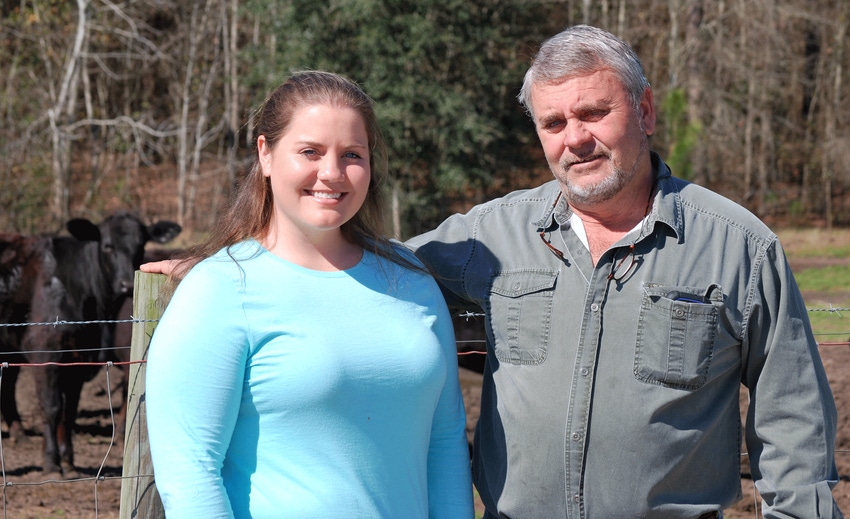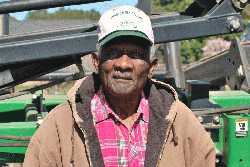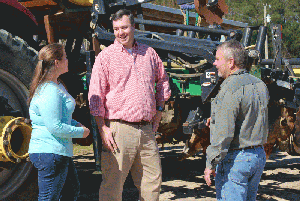
Jan tore up the peanut picker. Jerry, not in a whisper, said, “What are you really doing here?” The incident was a tipping point in a life decision Jan had made. She and her father, in time, were going to have to figure out the answer.
“My dad is a real patient man but whenever he gets made, he gets mad,” said Jan of the picker-problem episode, which happened the summer of 2013. “But, I mean, I messed up.”
“She’s learned a lot since then,” Jerry said.
Since then, it has become clear what Jan is doing: She’s farming and plans to make a career (a life) as a farmer.
Jan, 26, is the oldest daughter of Jerry, 55, and Jill Jones. Jill is an accountant. They have two more daughters: Joy, 23, who received her engineering degree from Georgia Tech, and Jerilyn, 20, who’s going to the University of Georgia. In other words, Jerry’s been outnumbered for some time in his house, so to speak.
Jerry’s grandfather Harvey “H.L.” Lewis in 1919 bought the land the Joneses farm on the Grady-Decatur county line near the city of Climax in southwest Georgia. Jill’s family is also a well-established farming family in the area. Her brother, Mark Whigham, and Jerry help each other out as needed during planting or harvesting time.
Just up the road from the farm, Jerry’s brother, Randall, and nephew, Jerry Wayne, manage Jones Country Meats, another family business that evolved several decades ago from a time when the Jones raised and killed hogs on the farm, along with having a smokehouse to cook the meat. Folks would buy ‘good meat’ off the farm. The state wanted the Jones to build a packing shed to sell the meat, and they got Jones Country Meats.
Jerry started farming with his father, L.D., in 1979, and at the time they had about 300 acres to work. They grew the farm, buying some land here, renting some land there. And from that, Jerry and Jill built their life and family together on the farm.
L.D. Jones died unexpectedly in 2000.
Traveling teacher comes home
Today, Jerry (and Jan) farm about 1,000 acres of cotton, corn and peanuts with about 150 head of cattle.
“We don’t want to get much bigger than that, at least not now. It’s what we can do without having to hire any additional labor, and it’s working for us right now,” Jerry said.
Jerry has one part-time employee, Jack Demps, 74, who, after retiring from Southern States in 2004, started working for Jerry. Mr. Demps is good help, especially with the cattle.

Jack Demps, 74, after retiring from Southern States in 2004, started working for Jerry Jones. Mr. Demps is good help, Jerry says, especially with the cattle.
Farming wasn’t Jan’s first choice of careers. She received a tuition-paid scholarship to Mercer University in Macon, Ga, graduating with a degree in English. She then went to work as a homeschool teacher for a family in Charleston, S.C. The family traveled a lot, across the U.S. and abroad. Jan liked the travel, but the job started changed from being less of a teacher’s role to more of a nanny role. She decided to go back home to the farm. She tore up the peanut picker soon after that.
“We always had chores to do, but daddy never forced us to work on the farm. But mom and dad have always told us wherever we go in life, we are always welcome to come back to the farm,” Jan said.
“It was as much of a surprise to me that she wanted to came back to the farm, I guess as much of a surprise as it was for her because in high school all she could talk about was traveling and seeing the world, and she got to do some of that,” Jerry said.
Jan got the traveling bug naturally. Jerry and Jill like to travel, too. The couple last August, during a lull after corn harvest, jumped in the automobile and headed west to the Ohio River Valley with no set agenda. They stopped and talked to folks when they wanted, too, and found places to lodge when they wanted a room. The trip lasted a couple of weeks. Jan was left in charge of things around the farm. Despite some truck problems on the farm, she handled things fine. Jerry said he and Jill plan to jump in the car again later this year and see someplace else.
On the farm, Jan has ‘some skin’ in the game now, too. She’s renting a field to manage on her own. The field is 68.4 acres exactly, she says, proudly and with a learned nod to the benefits of knowing and watching the details on the farm.
Jan is also heavily involved in the local and state levels of the Georgia Farm Bureau, which she says has helped her a lot in a short time with contacts, networking and opportunities to get better at farming and understanding how policies and actions away from the farm can directly impact their farm, for good or for bad.
Headstrong and stubborn sometimes
Jan and Jerry butt heads every now and again; they have different personalities and, at times, their own unique approaches to getting something done on the farm. Jan admits her father’s way wins out for now. She is learning what Jerry knows, which are the practices and tricks needed to make yields in their particular part of Georgia, which has heavier soils than what can be more dominate sandy loamy soils in counties close by.
Due to topography, fields in their area are typically smaller, too, than in nearby counties. Jones’ average field is about 50 acres. But they make good yields, pushing three tons per acre on peanuts, 2.5 to 3 bales on cotton and 225- to 250-bushel average on corn.

Brian Hayes, center, local University of Georgia Extension agent, says the Jones family has helped for many years Extension with on-the-farm trials. It goes both ways, Jerry said. Seeing firsthand how new varieties and practices work on his farm is valuable.
Jerry said his relationship with the local University of Georgia Extension has helped him fine-tune his approach on the farm over the years, mostly by participating in on-farm trials. It can be a hassle some years to manage the trial plots along with his commercial fields, but he says it has been well worth it to see exactly how a new variety or practices works on his farm.
“The Jones family has been very helpful for us over the years with on-farm trial work and data collection, which is valuable in allowing us to make the best recommendation for farmers in our area. We know if it is on their farm it will be done right,” said Brian Hayes, UGA Extension county agriculture agent in Grady County also helping in Decatur County
Jan is learning on the job. When someone asks Jan what she does for a living, Jan tells the person she is a farmer.
“You mean like a getting-dirty, driving-a-tractor type farmer?” some ask.
“Yep,” she says.
Farming is always changing, Jerry said. From the mules he remembers his granddaddy using on the farm to the GPS, high-powered tractors used today, the Jones farm has changed along with the rest and will continue to change. But it seems one thing hasn’t changed on the farm in its more than 100-year history: an older generation is still showing the next generation how to build a life on it.
About the Author(s)
You May Also Like






